Results of the BEACON CRC Phase III trial have shown that triple therapy targeting BRAF mutations in progressive metastatic colorectal tumours significantly improved overall survival and objective response compared to standard care.
The data, reported at the ESMO World Congress on Gastrointestinal Cancer 2019, suggest that the three-drug combination, encorafenib, binimetinib and cetuximab, should replace chemotherapy for the one in seven patients with metastatic colorectal cancer who have a BRAF mutation.1
“These are very exciting results because we’ve been trying to target BRAF-mutant colorectal cancer for many years. It’s encouraging to see such a significant improvement in overall survival and response in patients with such aggressive tumour biology. Hopefully, this will soon lead to increased access to this treatment for patients where there is currently such a large unmet need,” said study author Dr Scott Kopetz, from the UT MD Anderson Cancer Center, Houston, USA.
Kopetz explained that the three-drug combination builds on growing understanding of the activation of cancer genes such as BRAF and the effects of targeted therapies. “Colorectal cancer does not respond to BRAF therapy alone because tumour cells adapt through other mechanisms after initial treatment. With this triple targeted therapy, we are using a very scientifically logical combination to inhibit BRAF and these other mechanisms,” he pointed out.
Commenting on the relevance of the new data, Prof Andrés Cervantes from the Biomedical Research Institute INCLIVA, University of Valencia, Spain, stressed that it will be important for all patients with colorectal cancer to be tested for BRAF mutations in the light of the BEACON CRC findings. “We now have a specific treatment that can change the natural course of the disease in patients with BRAF mutations and is better than previous therapy, so it is essential that patients are routinely tested.”
He also highlighted the chemotherapy-free nature of the targeted combination used in the study. “In many other types of cancer, and particularly in colorectal cancer, it is common for biological targeted therapies to be used in combination with chemotherapy. The fact that we can give this targeted combination without the need for chemotherapy is very good news for patients, not least because of the side effects that they typically experience with chemotherapy,” he added.
“At present, targeted therapy should probably be limited to the patient group treated in the BEACON CRC trial who had progressed after one or two previous lines of chemotherapy. However, it is important that we investigate its use in other settings where more patients with BRAF mutations may also benefit, including those with less advanced metastatic disease and possibly in the adjuvant setting after primary surgery with curative intent,” concluded Cervantes.
Study results
In the global BEACON CRC study (NCT02928224), 665 patients with BRAF V600E-mutant colorectal cancer who had progressed after one or two prior regimens in the metastatic setting were randomised to receive triplet therapy, doublet therapy (encorafenib and cetuximab) or the investigator’s choice of irinotecan or folinic acid, fluoruracil and irinotecan (FOLFIRI) and cetuximab.
Median overall survival was 9 months (95% confidence interval [CI]: 8, 11,4) for the triplet targeted therapy compared to 5.4 months (95% CI: 4.8, 6.6) for standard therapy (hazard ratio [HR] 0.52; 95% CI: 0.39, 0.7, p<0.0001).
Confirmed objective response rate by blinded central review for the triplet targeted therapy was 26% (95% CI: 18, 35) compared to 2% (95% CI: 0,7, p<0.0001) for standard therapy.
Median overall survival for the doublet combination was 8.4 months (95% CI: 7.5, 11) compared to standard therapy (HR 0.6; 95% CI: 0.45, 0.79, p<0.0003). The study was not powered to compare triplet and doublet therapies but future analyses will explore which patients are most likely to benefit from triplet versus doublet combinations.
BRAF V600E targeted treatment was well tolerated, with Grade 3 or higher adverse events seen in 58% of patients on triplet treatment, 50% of those in the doublet group and 61% of those in the standard therapy group.
An ongoing study (ANCHOR-CRC) is investigating the effects of triplet therapy as first line treatment for patients with metastatic BRAF V600E-mutant colorectal cancer.
Reference
- 1 LBA-006 ‘BEACON CRC: a randomized, 3-Arm, phase 3 study of encorafenib and cetuximab with or without binimetinib vs. choice of either irinotecan or FOLFIRI plus cetuximab in BRAF V600E–mutant metastatic colorectal cancer’ presented by Scott Kopetz during Session XX: Colorectal Cancer (Part I) on Saturday, 6 July 09:20-10:05 CEST. Annals of Oncology 30 (Supplement 4): iv137–iv151, 2019










